6.5. Recruitment and Hiring in Policing
Tiffany Morey
Learning Objectives
After reading this section, students will be able to:
- Describe the parts of the written test
- Discuss why a candidate must study, study, study, for the oral board interview
- Explain the type of questions on an oral board interview
- List the different types of physical agility test
- Explain why departments are starting to utilize the assessment center test
- Recognize why a candidate’s background is the most important part of the testing process
- Describe why candidates fear the psychological evaluation
- Understand the B-Pad Video Test
Critical Thinking Questions
- What is on the written test?
- How should a candidate study for the oral board interview?
- What is the best way to prepare for the physical agility test?
- How can a candidate prepare for an assessment center?
- What is the best way to start preparing for the background investigation and interview?
- Does the psychological evaluation only check if a candidate is psycho or crazy?
History of Recruitment and Hiring
What History? ‘Nil’ For lack of a better word, would describe the history of recruitment and hiring of new officers. Before the 1960s, as long as the candidate was a white male, had a heartbeat, and there was an opening for a cop, the job was most likely his. Women and officers of color were all but non-existent on the force. Women were only allowed into the ‘boys-only club’ if they wore a pencil skirt and fit a prescribed role consistent with being a woman. In some departments, women were allowed to work in the detective bureau and interview children victims, because women supposedly talked to children better than men, because of their ‘maternal’ instincts. These stereotypes continued in policing towards women and minorities until new laws forbidding such behavior made their way onto the scene. With new employment laws passed between the 1960s to the late 1990s, many doors opened for women and minorities.
Recruitment and Hiring Example
When I was in the recruitment division of my police department and also as a professor at a university, I continually saw future police candidates unprepared for the Law Enforcement Testing Proces, a.k.a. The LET Prep For some reason, candidates assumed that if they had their associates or bachelor’s degree, they did not need to study and prepare for the LET Prep. Unfortunately, that could not be farther from the truth. Just like a high school student getting ready to enter college, needs to take the ACT or SAT, that student must still study and prepare for those tests if there is to be a successful outcome. Due to the importance and multifaceted LET Prep, it is even that much more critical that the candidate take the time to train and prepare. When asked how much time should be spent studying and preparing? My response was always “As much as you can!” But, in reality, the candidate should start preparing a minimum of six months before the written test (which is the beginning step of the LET Prep). A good guide is one hour a night. Also, I recommend studying appropriately for each part of the LET Prep. For example: The Oral Board Interview should be prepared with the candidate speaking aloud the answers to pre-determined questions (such as: “Tell us about yourself”), the candidate should video themselves to playback, watch, and learn from, and if at all possible the candidate should ask friends and family to sit on a ‘mock oral board panel’ and the candidate should answer questions aloud and in front of the panel. The more realistic the training, the better prepared the candidate will be.
The Law Enforcement Testing Preparation (LET Prep)
One of the most challenging entry-level testing processes in the United States is for the position of police officer. A typical ‘regular’ job, such as a cashier at a store, requires the candidate to fill out a job application, then go onto a job interview, and poof, they are hired! There is a good reason why the LET Prep is so difficult and thorough. Unlike a cashier, a police officer, once hired and trained, becomes the beholder of great power with authority to take away a person’s freedom all under the protection of the government to shoot and possibly take a life, when a life is threatened. Officers have the authority to take away a person’s rights and freedoms and this type of power should not be given to anyone with just the flick of a coin, the testing process should be rigorous and thorough. Therefore, with those facts, the law enforcement testing process should be thorough and rigorous, to ensure the right candidate is hired.
When thinking of the LET Prep, it can help to compare it to the ACT, SAT, National Football League Training Camp, and military boot camp, all combined. The best way a new candidate can ensure failure is to forego studying and go into the process unprepared.
Written Test -LET Prep
The written test is tough! It can be compared with the ACT and SAT and some parts are even a bit more difficult! Eighty percent of the candidates who take the written test fail! The written test has the following types of questions:
- Reading Comprehension
- Vocabulary
- Spelling and Grammar
- Observation/Memory
- Deductive Reasoning/Inductive Reasoning
- Spatial Orientation
- Math
- Essay/Incident Report Writing/Written Communication
- Analytical Ability
Every law enforcement department is different, although generally there are two basic ways departments administer the written test. The first is through an online testing service. The candidate registers online to take the test and then will go to a pre-determined location (such as a library) with a proctor, to take the written exam on a computer. The candidate can then send their exam score to a participating law enforcement agency, to which the candidate is applying. The second is through the law enforcement agency itself. The agency the candidate is testing for will post the written test date, and the candidate will respond to the agency and take the written test. Most agencies score the written test on site, and the candidate learns right there and then if they have a passing score to move forward in the testing process. Every agency also differs concerning the passing score. Most agencies require at least seventy percent to pass the written test and move on in the hiring process. Although there are no set rules as to the passing score, some agencies require seventy-five or eighty percent to pass the written test, it just depends on the individual agency.
The written test is tough! There are no shortcuts for studying for it, except to sit down and put the time in. The best way to study is to take one subject at a time, study one hour a night, and follow up with practice tests of the respective subject. List the areas of concern after grading the practice tests and move on to the next subject. After all subjects have been studied, go back and spend more time focusing on the areas of concern. A reasonable period needed to study for the written test is generally six to twelve months.
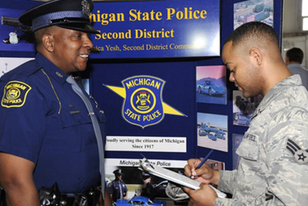
Senior Airman Alfonzsa Jackson of the 127th Maintenance Squadron speaks with Trooper Walter Crider of the Michigan State Police during the Hiring Our Heroes job fair at Selfridge Air National Guard Base, Mich., May. 18, 2013. Jackson, a six-year member of the Air National Guard and recently a member of the 127th MXS Aerospace Ground Equipment crew, attended the job fair to explore possible career opportunities in law enforcement. More than 300 were in attendance visiting with representatives of more than 50 employers. (U.S. Air National Guard photo by TSgt. David Kujawa.)
Physical Agility Test- LET Prep
The physical agility test is given in three different ways, depending on the department;
#1-State Physical Agility Test: In Oregon, for example, most of the departments utilize the ORPAT or Oregon Physical Agility Test. The ORPAT is a job sample physical ability assessment process. The goal is to assess an entry-level police officer candidate in the physical demands a police officer is likely to replicate during routine duties.
- Part One- Mobility Run: 1235 Foot Obstacle Run Where the Candidate Demonstrates Mobility, Agility, Flexibility, Power, and General Physical Endurance
- Part Two- Push Activity, Controlled Falls, Pull Activity
- Part Three- ‘Dummy’ Drag, 165-pound ‘Dummy’ is Dragged 25 Feet
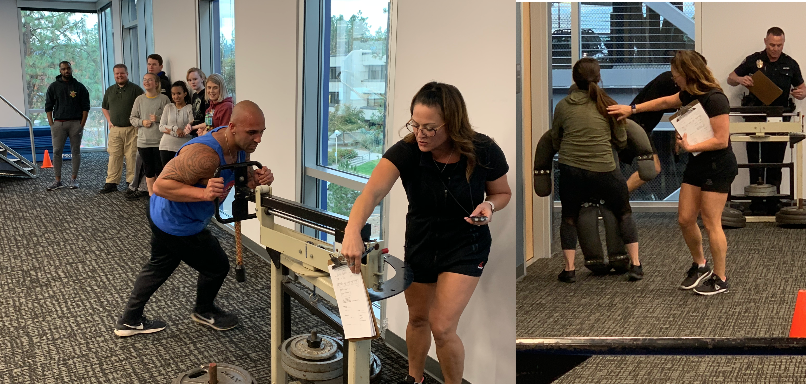
#2-Physical Agility Test: A department will hire various testing agencies that have developed physical agility courses, to set up and test entry-level police candidates.
- A description of a ‘dummy’ suspect is given (this ‘dummy’ just committed a crime)
- The candidate runs through various obstacles; four-foot cyclone fence jump, window crawl through, one-hundred to three-hundred-yard dash, and six-foot fence jump
- The candidate picks the suspect ‘dummy’ out of a lineup and drags the one-hundred+ pound suspect ‘dummy’ twenty+ feet
#3-Military Physical Fitness Test
- Push-ups: a certain number, in a specified amount of time
- Sit-ups: a certain number, in a specified amount of time
- Pull-ups: a certain number, in a specified amount of time
- Two-mile run: in a specified amount of time (times are dependent on the sex and age of the candidate)
Just as with the written test, the physical agility/physical fitness test must be prepared for. All of the above three tests require the candidate to work out and perform various physical fitness activities for a specified period before the testing process to ensure the candidate is in proper physical condition for the test. It is also the time for the candidate to realize that physical fitness must be a career-long decision in law enforcement, and this is the perfect time to start with the mindset of keeping physically fit as a lifestyle.
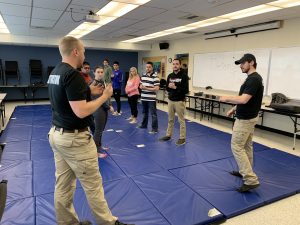
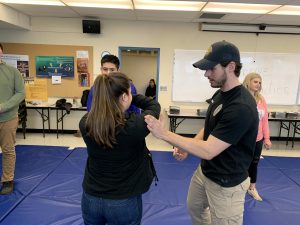
Officers with the Ashland Police Department teach a defensive tactics class during the annual Lock-In Event. This is a great time for SOU CCJ students to learn the tactics officers train in during the police academy and every year during defensive tactics recertification.
Oral Board Interview- LET Prep
The oral board interview is one of the least prepared for testing portion of the LET Prep since the questions for an entry-level police officer candidate are very basic:
- Tell us about yourself.
- Why do you want to be a police officer?
- What have you done to prepare for the job?
There often is the feeling by candidates, that the answers to the above questions are a given and known, therefore why would one need to study or prepare for such easy questions? However, that way of thinking could not be further from the truth. The oral board interview consists of a table with four police department representatives, usually a police officer, possibly a volunteer police department representative, and one or two supervisors on one side of the table, and one chair placed in the center of the room (or the opposite side of the table) for the candidate to sit. This setup is meant to place the candidate on the spot and cause some stress to occur. This will help the panel members see how the candidate responds to stress. The reason behind this is that the job of a police officer will entail at times, stressful situations and being the center of attention when citizens look towards the police officer for guidance. Therefore, this is one way to gauge how the candidate or future police officer will respond in a stressful situation.
Successful candidates learn positive ways to prepare for the oral board interview by taking college/university classes, obtaining study guides, writing out answers to the obvious questions, memorizing answers, and conducting practice sessions with family and friends where the questions and answers are read aloud.
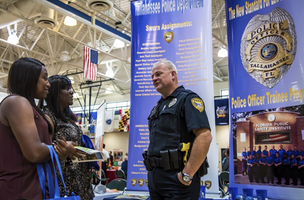
Oral Board Story
I have been a panel member on dozens of entry-level police officer oral board interviews. I was always amazed at how unprepared the candidates were. Once during one oral board interview, one candidate was asked: “Tell us about yourself,” to which the candidate began by rolling his eyes towards the ceiling while he chomped on his gum and proceeded to say: “hmm…..well……hmm” and then he put his right hand into his right pant’s pocket and began jingling his keys. The room was quiet other than the panel members’ thoughts of how this question could have stumped the candidate. The candidate proceeded by swallowing loudly and without making eye contact with any of the panel members said: “I am in college and I just broke up with my girlfriend and … hold on…let me think…I know there was something else…could you repeat the question?”
At this time I put him out of his misery and moved on to the next question. He, of course, continued to flail with each question, and in the end, he failed the oral board interview. I do not know if he would have made a good police officer or not, but I do know this…he did not prepare for his oral board interview. I can almost guarantee (because I have seen this from many other candidates as well) that he knew we would ask that particular question, but he figured, why did he need to study that question? He knew all about himself, heck he grew up with himself, and he often spoke to his friends and family about himself regularly so of course, he would not have any trouble rambling off all the amazing things he had done in his life. Unfortunately, he did not figure out one big thing; STRESS! Stress and nerves cause the most confident of us to freeze and stumble on our words.
Therefore, the most poised of us must prepare a handwritten (or typed) pre-determined answer to many such questions, then create study cards (or notes on a smartphone) of the appropriate answer, and finally study, study, and study more, and memorize! That way when the actual stress hits and the nerves take over, the immediate response will be to go back to what was studied. Don’t take my word for it. Look it up! It is a favorite tool and is used by police officers regularly in their weapons and defensive tactics training as well. Can you think of a more stressful, nerve-racking situation, than having a person threaten or point a weapon at you? The way most officers begin to respond to such stressful situations is they revert unknowingly to their training.
A second example of a female candidate on an oral board interview; a common question on the oral board panel has to do with knowledge of the department the candidate is testing for. As I read the following question to the female candidate, her eyes opened as big as a flying saucer. “Who is the Police Chief of this department?” As the clock ticked away the seconds, her mouth continued to slowly open and eventually it completed the fish open mouth look. She, of course, did not know the answer. As the questions continued, it became apparent that she was going to fail as well, due to her lack of studying. My recommendation… if you want to work somewhere, you really should know a little bit about the department, especially who the top cop is!
Assessment Center/B-Pad- LET Prep
Assessment centers are not new to police department testing. However, they have generally been utilized for management promotional testing, when a police officer tests to be a sergeant or a sergeant tests to be a lieutenant. With successful results in the previous arena and with the importance of hiring the best candidate, human resources and recruitment divisions have turned towards assessment centers and B-Pad Video Assessment, as an additional layer of testing in the LET Prep, to ensure hiring of the correct candidate.
Assessment centers are practical testing situations, where the candidate must ‘act’ out their response. It is a time for the testing agency to see how the candidate might respond in different situations. One of the most common assessment centers utilized at the entry police candidate level is the group assessment center. This group assessment center can look very different depending on the agency hosting the assessment, but the general framework is the same for all. For the group assessment center, eight to twelve candidates will enter the testing facility and sit around a table. The proctor will then give the candidates an ‘issue’ to solve. Example issue: “There have been a large number of bicycles stolen from the university in the last three months. What can we do to stop this?” There will be two to four evaluators at a table adjacent to where the candidates are sitting, and the evaluators watch and listen while the candidates try and solve the issue. It is impressive how quickly candidates lose their temper, become rude to other candidates, talk over candidates, or more positively, how candidates work with other candidates, complement real ideas, and work quickly towards a viable solution.
B-Pad Video Assessments are completed generally with one candidate at a time. A candidate enters a room alone, and a proctor shows the candidate a projector screen and a video camera. A video camera records the candidate. The proctor starts the video camera recording and leaves the room. Once the video starts playing, the candidate must respond towards the screen, and ‘act’ out whatever the candidate feels is the appropriate answer to the situation. One such example of the scenario played on the video was of a mentally challenged individual who was asking to return to Mars. The individual in the video had a knife. The candidate had to talk and act out what should be said to the mentally challenged individual in the video. The recording of the candidate is then watched at a later time by a panel of evaluators from the department and graded accordingly.
Hiring Example
Candidates are often terrified when it comes to the psych eval and the medical physical. One common question I usually get is: “I am currently taking a prescription of an anti-depressant, prescribed by my family doctor because I am bipolar. Will this keep me from being a police officer?” My answer is always, “I do not know.” But I further explain that this is not a decision made by the police agency itself, instead, the recommendation to hire or not is made by the psychologist (who evaluated the psychological evaluation) and the medical doctor (who evaluated the medical/physical). Both doctors will look at the entire psychological and medical profile of the candidate and together make a recommendation to the hiring agency on whether or not the medication and reason for the use of the medication could be an issue.
Background Investigation-LET Prep
The background investigation is probably one of the most critical portions of the testing process. After the candidate passes the written, physical fitness/agility, oral board interview, and assessment center portions of the test, the candidate is given a background packet to fill out. The packet is very thorough and asks the candidate everything from where the candidate went to school, worked, prior drug use, prior arrests, and prior illegal actions/criminal activity (even if not arrested). The background investigator can spend days to weeks, investigating the candidate to ensure honesty and a good moral compass. One issue in this portion of the testing centers around prior drug use and criminal activity. Unfortunately, most agencies do not list their requirements on past drug use openly. Several agencies utilize the FBI’s prior drug use policy. However, most agencies can make their own decisions for each candidate.
Psychological Evaluation- LET Prep
The psychological evaluation (psych eval) is one of the least understood of the hiring process. When asked, a majority of the candidates openly state they have nothing to worry about since the psych eval only tests for psychos, but they will also admit that they quietly fear the psych eval since it is the unknown that causes the most fear. There is no way to study for the psych eval. The best advice given is to tell the truth and this holds for every part of the L.E.T. Process. However, do understand that the psych eval is not just looking for those candidates with mental illnesses, it is also looking for those who will not make good police officers or have aggression issues or controlling issues to name a few.
Medical Examination- LET Prep
The state where the candidate is going to work as a police officer will determine the depth at which the medical/physical is completed. Possible testing that could occur during this phase of the testing process is:
- Blood/urine/hair drug tests
- Hearing test
- Eye examination
- Lung capacity
- EKG
- Treadmill stress test
- Chest X-Ray
- Cholesterol test
- Various other blood tests
Chief or Sheriff Interview- LET Prep
Once a candidate has passed the written test, physical agility test, oral board interview, group assessment center/B-Pad assessment, and background investigation, if the department is still interested in the candidate, the candidate is made a ‘conditional offer of employment.’ In layman’s terms, it means the department is interested in the candidate, but still wants the candidate to go through the psych eval and medical physical. Due to the intrusiveness of those two tests and results, the department must prove they are interested in the candidate enough to make a conditional offer of employment, all of which is dependent on the results of those two tests, of course.
If the candidate shows no issues with the psych eval or medical/physical, the candidate is then called into the Chief or Sheriff’s office (depending on the department) for an interview. After the interview and all of the above testing areas are finished, the Chief or Sheriff will most likely call a meeting with the background investigator and the psychologist who completed the psych eval and go over the final candidates one by one. From this meeting, a list is created of whom the department will hire. An ‘informal’ type of interview is informal since the ‘top cop’ (a.k.a. Chief or Sheriff) is looking to meet a potential new police officer.

Mentoring and Retaining
All too often, departments place everything into the LET Prep, and then after the candidate is offered the job, accepts, and starts the dream job of a police officer, this new officer can be lost and forgotten in the shuffle. Departments must ensure that mentoring and retaining occurs. Mentoring can be completed through proper supervision from the top down and ensuring first-level supervisors are responsible for those they supervise. A good supervisor can make the difference between an officer disliking or loving their job.

